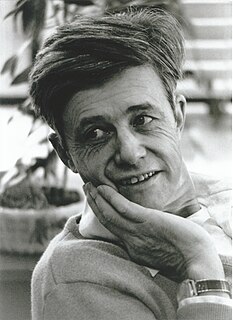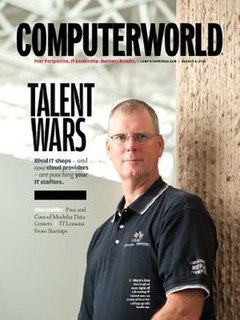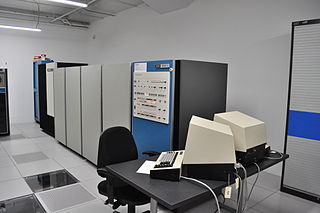APL is a programming language developed in the 1960s by Kenneth E. Iverson. Its central datatype is the multidimensional array. It uses a large range of special graphic symbols to represent most functions and operators, leading to very concise code. It has been an important influence on the development of concept modeling, spreadsheets, functional programming, and computer math packages. It has also inspired several other programming languages.

Kenneth Eugene Iverson was a Canadian computer scientist noted for the development of the programming language APL. He was honored with the Turing Award in 1979 "for his pioneering effort in programming languages and mathematical notation resulting in what the computing field now knows as APL; for his contributions to the implementation of interactive systems, to educational uses of APL, and to programming language theory and practice".
International Data Group, Inc. (IDG) is a Massachusetts registered and headquartered media, events and research company focused on the tech landscape. Founded in 1964 by Patrick Joseph McGovern in Newtonville, Massachusetts, the organization is made up of International Data Corporation (IDC) and IDG Communications, which includes the CIO, Computerworld, PCWorld, Macworld, InfoWorld, and JavaWorld brands. Serving technology decision-makers and enthusiasts in 147 countries, IDG was bought by China Oceanwide in 2017 while maintaining U.S. based leadership.

Roger D. Moore was the 1973 recipient of the Grace Murray Hopper Award from the Association for Computing Machinery (ACM). It was given: "For their work in the design and implementation of APL\360, setting new standards in simplicity, efficiency, reliability and response time for interactive systems."
Framingham High School, or FHS, is an urban/suburban public high school in the city of Framingham, Massachusetts, located approximately 20 miles west of Boston. Founded in 1792, as Framingham Academy, the high school is the result of the merger of Framingham North and Framingham South High Schools in 1991.

PRIMOS is an operating system developed during the 1970s by Prime Computer for its minicomputer systems. It rapidly gained popularity and by the mid-1980s was a serious contender as a mainline minicomputer operating system.

Computerworld is an ongoing decades old professional publication which in 2014 "went digital." Its audience is information technology (IT) and business technology professionals, and is available via a publication website and as a digital magazine.
I. P. Sharp Associates (IPSA) was a major Canadian computer time-sharing, consulting and services firm of the 1970s and 1980s. IPSA is well known for its work on the programming language APL, an early packet switching computer network named IPSANET, and a powerful mainframe computer-based email system named 666 Box, stylized as 666 BOX. It was purchased in 1987 by Reuters Group, which used them until 2005 as a data warehousing center for business data.
CEO Office software from Data General was introduced in 1981. It included word processing, e-mail, spreadsheets, business graphics and desktop accessories. The software was developed mostly in PL/I on and for the AOS and AOS/VS operating systems.

International Data Corporation (IDC) is an American provider of market intelligence, advisory services, and events for the information technology, telecommunications, and consumer technology markets. Founded in 1964, IDC is a wholly owned subsidiary of International Data Group (IDG), a media, data and marketing services company.
Applied Data Research (ADR) was a large software vendor from the 1960s until the mid-1980s. ADR is often described as "the first independent software vendor".

Symantec Endpoint Protection, developed by Symantec, is a security software suite, which consists of anti-malware, intrusion prevention and firewall features for server and desktop computers. It has the largest market-share of any product for endpoint security.
Edos was an operating system based upon IBM's original mainframe DOS. The name stood for extended disk operating system.

PictureTel Corporation, often shortened to PictureTel Corp., was one of the first commercial videoconferencing product companies. It achieved peak revenues of over $490 million in 1996 and 1997 and was eventually acquired by Polycom in October 2001.
Utimaco Atalla, founded as Atalla Technovation and formerly known as Atalla Corporation or HP Atalla, is a security vendor, active in the market segments of data security and cryptography. Atalla provides government-grade end-to-end products in network security, and hardware security modules (HSMs) used in automated teller machines (ATMs) and Internet security. The company was founded by Egyptian engineer Mohamed M. Atalla in 1972. Atalla HSMs are the payment card industry's de facto standard, protecting 250 million card transactions daily as of 2013, and securing the majority of the world's ATM transactions as of 2014.
CP-6 is a discontinued computer operating system developed by Honeywell, Inc. in 1976. It was a backward-compatible work-alike of the Xerox CP-V fully rewritten for Honeywell Level/66 hardware. CP-6 was a command line oriented system. A terminal emulator allowed use of PCs as CP-6 terminals.
Edward Sidney Bopp Jr., known as Eddie Bopp, was a pharmacist and lawyer from his native New Orleans, Louisiana, who served from 1977 to 1984 as a Democrat in the Louisiana House of Representatives for District 103 encompassing part of Orleans and St. Bernard parishes.

The Xerox Sigma 9, also known as the XDS Sigma 9, was a high-speed, general purpose computer.
Windows 10, an operating system released by Microsoft in July 2015, has been criticized by reviewers and users. Due to issues mostly about privacy, it has been the subject of a number of negative assessments by various groups.
Informatics General Corporation, earlier Informatics, Inc., was an American computer software company in existence from 1962 through 1985 and based in Los Angeles, California. It made a variety of software products, and was especially known for its Mark IV file management and report generation product for IBM mainframes, which became the best-selling corporate packaged software product of its time. It also ran computer service bureaus and sold turnkey systems to specific industries. By the mid-1980s Informatics had revenues of near $200 million and over 2,500 employees.







